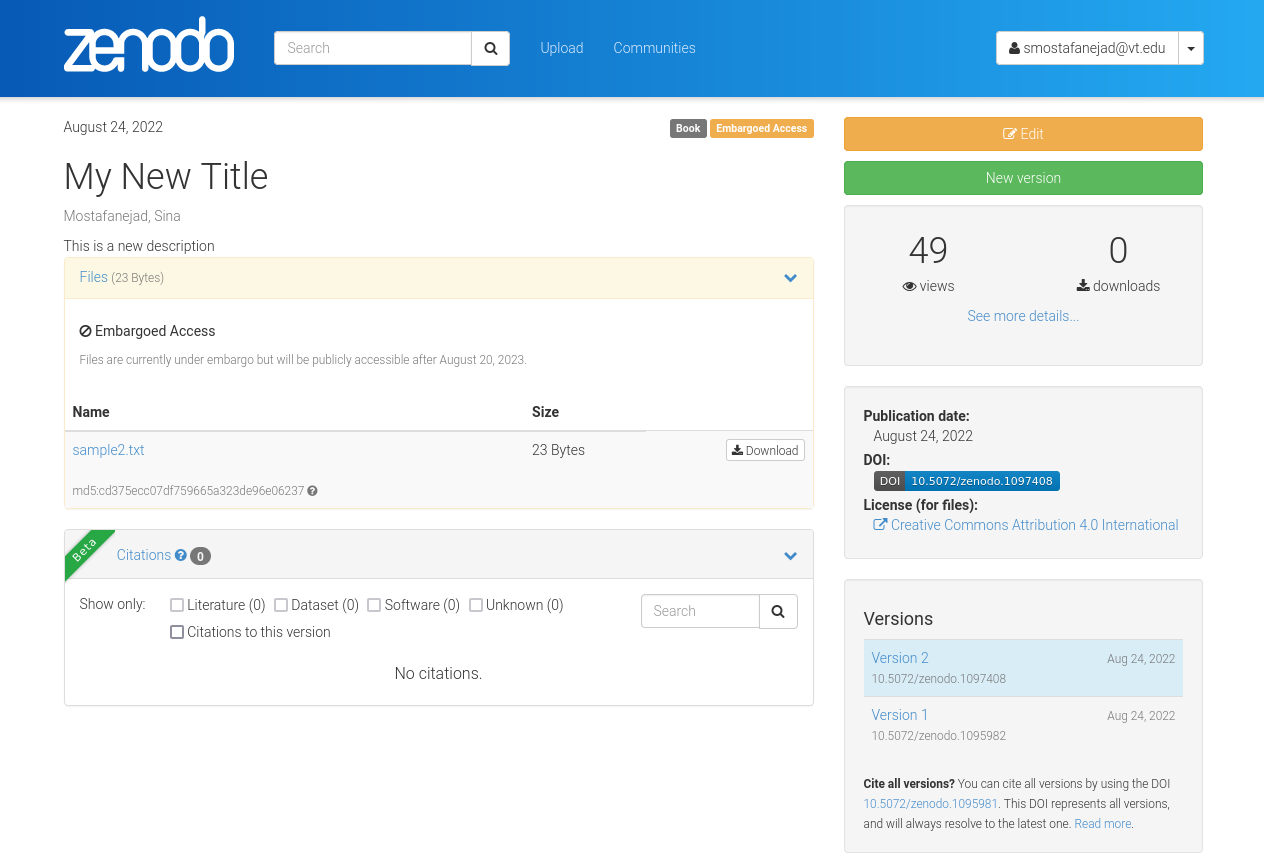How to Edit a Submitted Deposition#
Note
Before going through this document, make sure you know how to create
an instance of the _DepositionActions class, depo_act_obj,
by reviewing the How to Work with Deposition Actions guide.
Let’s consider a mock deposition in a Zenodo Sandbox account that has been already published. A published deposition can be easily identified with a green check mark and a blue publication date label with a version number in parentheses besides the title as shown below.

Tip
Hovering the mouse cursor on the deposition title shows its ID (1097408, in this case) on the status bar at the bottom-left corner of the screen.
Next, click on the title to navigate to the deposition’s content page

There is an orange Edit button at the top-right corner of the screen which allows you to “unlock” the state of the deposition by creating a temporary copy of the current “locked” published version for further modifications. The unlocked deposition, which can now be edited, is marked by a red upper-arrow (upload) icon near its title as shown below

The aforementioned change from published to draft state can be
programmatically performed in zenopy by calling the deposition_action()
function on an instance of the _DepositionActions class and passing
action = 'edit' as an argument
>>> my_depo = depo_act_obj.deposition_action(id_=1097408, action='edit')
>>> my_depo
<zenopy.record.Record at 0x7fd6f430ec20>
Now, we can inspect the contents of the record stored in the my_repo variable
>>> my_depo.data
Output exceeds the size limit. Open the full output data in a text editor
{'conceptdoi': '10.5072/zenodo.1095981',
'conceptrecid': '1095981',
'created': '2022-08-29T17:57:05.414428+00:00',
'doi': '10.5072/zenodo.1097408',
'doi_url': 'https://doi.org/10.5072/zenodo.1097408',
'files': [{'checksum': 'cd375ecc07df759665a323de96e06237',
'filename': 'sample2.txt',
'filesize': 23,
'id': '5dfbf589-a8f7-4853-81d8-1b03665f19bf',
'links': {'download': 'https://sandbox.zenodo.org/api/files/d3b3bacd-a973-4454-95f2-c7a4441e6d97/sample2.txt',
'self': 'https://sandbox.zenodo.org/api/deposit/depositions/1097408/files/5dfbf589-a8f7-4853-81d8-1b03665f19bf'}}],
'id': 1097408,
'links': {'badge': 'https://sandbox.zenodo.org/badge/doi/10.5072/zenodo.1097408.svg',
'bucket': 'https://sandbox.zenodo.org/api/files/d3b3bacd-a973-4454-95f2-c7a4441e6d97',
'conceptbadge': 'https://sandbox.zenodo.org/badge/doi/10.5072/zenodo.1095981.svg',
'conceptdoi': 'https://doi.org/10.5072/zenodo.1095981',
'doi': 'https://doi.org/10.5072/zenodo.1097408',
'latest': 'https://sandbox.zenodo.org/api/records/1097408',
'latest_html': 'https://sandbox.zenodo.org/record/1097408',
'record': 'https://sandbox.zenodo.org/api/records/1097408',
'record_html': 'https://sandbox.zenodo.org/record/1097408'},
'metadata': {'access_right': 'embargoed',
'creators': [{'name': 'Mostafanejad, Sina'}],
'description': 'This is a new description',
'doi': '10.5072/zenodo.1097408',
...
'owner': 123811,
'record_id': 1097408,
'state': 'inprogress',
'submitted': True,
'title': 'My New Title'}
You can see the field state is now set to inprogress.
As such, you can treat the my_depo variable as a normal
deposition object.
